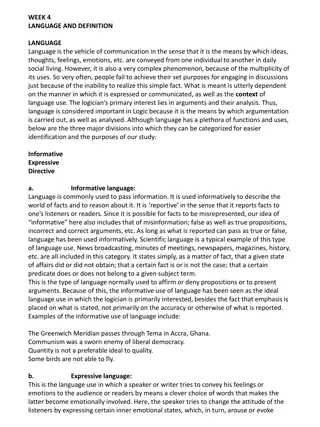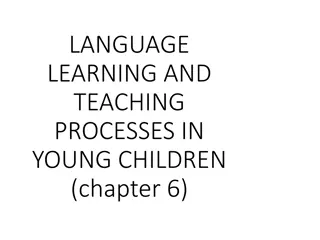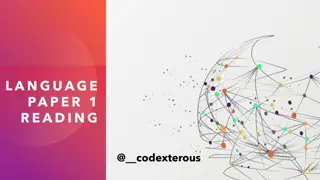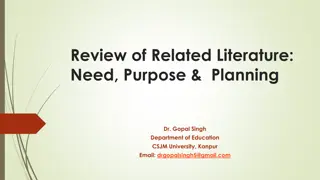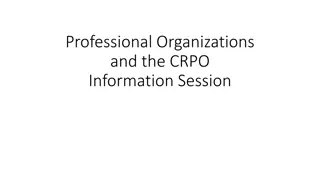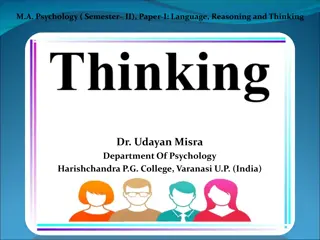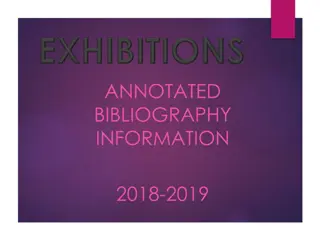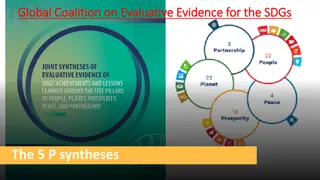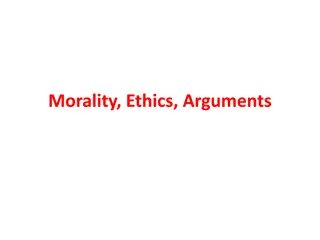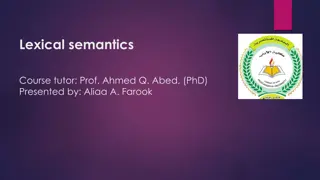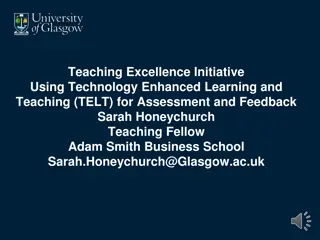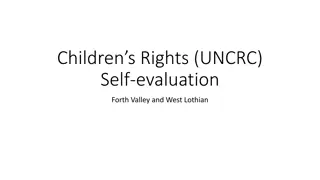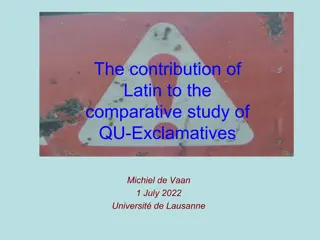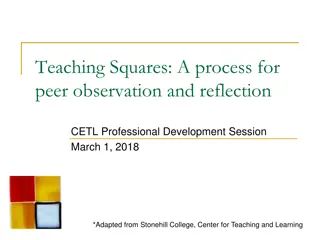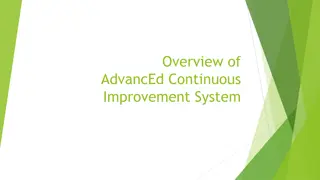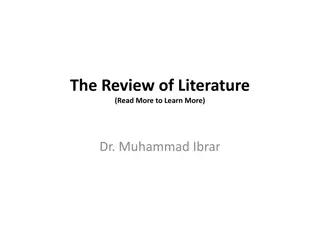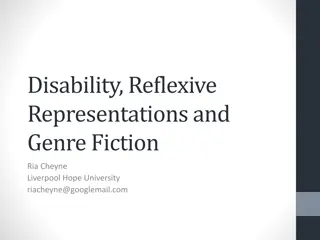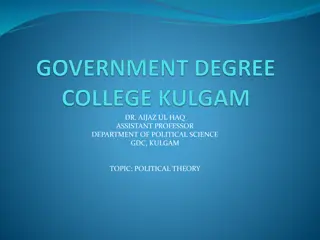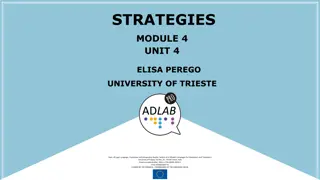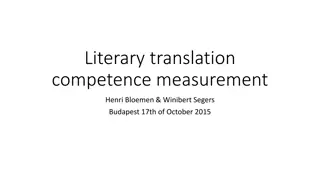Career Opportunities and Challenges in Translation & Interpreting Pedagogy Post-Pandemic
The APTIS 2022 conference explores new avenues in Translation and Interpreting (T&I) pedagogy amidst a changing landscape. Dr. Bego A. Rodriguez highlights emerging roles for T&I graduates. The context reveals a decline in language learning in the UK, impacting the Language Service Industry. The UK'
0 views • 13 slides
Language Study Community – Enhance Your Language Skills
Joining a Language Study Group is a fantastic way to take your language learning to the next level. By leveraging the power of Group Study, you can immerse yourself in the language, enhance your understanding, and build confidence in your speaking abilities. Read full article \/\/explainlearning.com
1 views • 3 slides
Academic Language Demands and Supports in Instructional Planning
Academic Language Demands and Supports are crucial in educational settings to ensure comprehension and usage of language by students. This content discusses embedding language demands in lesson plans, providing language supports, and peer review activities to enhance academic language skills. The fo
6 views • 10 slides
The Significance of Media in Language Learning
Media plays a crucial role in language learning by raising awareness of the ideology behind linguistic structures and providing valuable information on society and culture. Linguists are drawn to media language for research purposes and to understand its impact on language use and attitudes. Media s
12 views • 5 slides
Understanding Translation: Key Concepts and Definitions
Translation involves transferring written text from one language to another, while interpreting deals with oral communication. Etymologically, the term "translation" comes from Latin meaning "to carry over." It is a process of replacing an original text with another in a different language. Translat
11 views • 76 slides
Language and Communication in Society: Understanding Interactions
Explore the intricate relationship between language and society through lectures focusing on language in interaction, power dynamics, language contact and change, public space discourse, linguistic landscaping, and more. Delve into the shift from structural linguistics to societal communication, red
6 views • 28 slides
SAFe Roadmap Template for Large-Scale Agile Environments
This SAFe roadmap template is designed for showcasing projected and actual product statuses in large-scale Agile environments. It features customizable Program Increment planning columns to indicate objectives, timelines, milestones, and additional details. Ideal for securing project sponsor support
2 views • 4 slides
Understanding Language: Informative, Expressive, and Directive Uses
Language serves as a vital medium for communication, allowing the conveyance of ideas, thoughts, and emotions. It is a complex phenomenon with diverse uses. This text delves into the three major divisions of language use - informative, expressive, and directive. Informative language conveys facts, w
4 views • 6 slides
Overview of 38 CFR Part 4 Rating Schedule
This class provides a general overview of 38 CFR Part 4, covering essential aspects such as evaluative rating, resolution of reasonable doubt, evaluation of evidence, and principles for assigning disability ratings. It emphasizes the importance of accurate medical exams and understanding rating perc
0 views • 84 slides
Language Learning and Teaching Processes in Young Children
Development of language in young children is influenced by various factors such as their cultural and linguistic environment, unique characteristics, and interactions with adults. Optimal language development requires language stimulation from the environment. Varied cultural practices impact langua
1 views • 51 slides
Examining Language and Structure in GCSE English Language Preparation
Exploring the effective preparation strategies for GCSE English Language through language and structural analysis. Techniques for shaping meaning using evaluative words, image interpretation, and identifying key structural moments in texts are discussed and exemplified.
1 views • 14 slides
Understanding Literature Reviews: Process, Purpose, and Types
A literature review is an essential part of academic research, providing a synthesis of existing studies on a topic. It involves reviewing published information within a specific subject area to help the reader understand the research background. The process of conducting a literature review is meti
0 views • 70 slides
Professional Organizations and the CRPO Information Session
Professional organizations like AAMFT, CAMFT, and OAMFT play a crucial role in protecting providers, offering services, and providing training at better rates for Marriage and Family Therapists and healthcare providers. The American Association for Marriage and Family Therapy (AAMFT) is a prominent
0 views • 61 slides
Understanding Different Types of Thinking in Psychology
Thinking is a complex mental process that involves manipulation of information to find solutions or make decisions. This process includes concepts, propositions, and images and can be goal-oriented and influenced by past experiences. Different types of thinking include Autistic, Realistic, Convergen
1 views • 10 slides
Enhancing Language Learning Across the Curriculum in B.Ed. 1st Year Course
Language Across the Curriculum (LAC) emphasizes that language learning should occur across all subjects, not just in language classrooms. It highlights the importance of incorporating language development into every learning activity, fostering multilingualism in schools. Language plays a crucial ro
2 views • 34 slides
Understanding Annotated Bibliographies: A Comprehensive Guide
An annotated bibliography is a curated list of citations to various sources followed by descriptive and evaluative paragraphs, providing insight into the relevance, accuracy, and quality of each source. It serves as a valuable tool for researchers to organize, evaluate, and document their sources ef
0 views • 13 slides
Global Coalition on Evaluative Evidence for the SDGs
The Global Coalition on Evaluative Evidence for the SDGs aims to synthesize existing data to accelerate SDG achievements by providing insights, analysis, and policy recommendations. It focuses on evaluating the progress towards the SDGs, identifying barriers, and suggesting ways to achieve the goals
0 views • 8 slides
Evaluating GEF's Performance and Impact through OPS5 Consultations
The OPS5 consultations in Dakar, March 2013 aimed to assess the GEF's effectiveness in achieving its objectives, identify potential improvements, and integrate evaluative evidence across various streams including country portfolio evaluations and thematic evaluations. The study also focused on refin
2 views • 20 slides
Speech and Language Developmental Milestones: A Bilingual/Multilingual Perspective
Speech and language developmental milestones are crucial for children, regardless of their home language. These milestones encompass receptive language, expressive language, pragmatics, and articulation and phonology. Understanding how a child hears and talks from birth to one year is essential, as
1 views • 23 slides
Understanding Morality, Ethics, and Arguments in Philosophy
Morality and ethics are interconnected concepts that delve into the principles of right and wrong conduct. They involve disciplined reflection on human moral intuitions and choices. Valid and invalid moral arguments exemplify the importance of drawing evaluative conclusions from facts. Various ethic
0 views • 9 slides
Combatting Kidney Disease in Children: Importance of Early Detection and Education
Kidney disease affects millions worldwide, including children at risk from an early age. Encouraging education, early detection, and a healthy lifestyle is crucial to combat preventable kidney diseases. Various disorders like Vesicoureteral Reflux (VUR) and UTIs pose significant challenges, emphasiz
0 views • 11 slides
Introduction to Language Technologies at Jožef Stefan International Postgraduate School
This module on Knowledge Technologies at Jožef Stefan International Postgraduate School explores various aspects of Language Technologies, including Computational Linguistics, Natural Language Processing, and Human Language Technologies. The course covers computer processing of natural language, ap
0 views • 27 slides
Understanding Lexical Semantics: An Overview
Lexical semantics explores the relationships words have with each other and with our understanding of reality. It delves into reference and sense, naming theory, synonymy, and more. Reference focuses on how words relate to objects, while sense deals with relationships between lexical items. Naming t
0 views • 10 slides
Using Technology for Assessment and Feedback in Teaching Excellence Initiative
Self-regulated learners in higher education benefit from active involvement in assessment and feedback processes, leading to deeper learning. Good assessment and feedback practices promote self-regulation by engaging students in setting goals, making evaluative decisions, generating feedback, and re
0 views • 6 slides
Exploring Sociolinguistics: Language Variation and Social Factors
Sociolinguistics delves into the study of language variation influenced by social factors, examining the relationship between language and its social context. It explores various aspects like standard pronunciation, language choice, speech acts, language components, language variety, and factors suc
0 views • 73 slides
Understanding Assembly Language Programming for Computing Layers
Assembly language is a low-level programming language that enables direct interaction with a computer's hardware components. This content explores the fundamentals of assembly language, the relationship between human-readable machine language and binary code, an assembly language program for multipl
0 views • 31 slides
Effective Communication in Workplace Safety Training
This presentation covers the importance of effective communication in workplace safety training, emphasizing the elements of a communication plan, communication processes, and the realities of communication. It explores the consequences of failure to communicate safety information effectively and di
1 views • 31 slides
Children's Rights (UNCRC) Self-evaluation Resource for Educational Settings
Introduction of the UNCRC incorporation into Scots law and its implications for educational settings. Designed to provide evaluative statements, examples, and prompts for understanding and implementing children's rights in practice. Includes guidance on using the resource and navigation through 5 se
0 views • 108 slides
Understanding Language Anxiety in Foreign Language Learning and Teaching
Explore the impact of language anxiety on students and teachers in foreign language learning and teaching contexts through insights from Dr. Christina Gkonou's research. Delve into the theoretical background, implications for language education, and real-life experiences shared at the Essex Language
0 views • 25 slides
Latin's Contribution to Comparative Study of QU-Exclamatives
The study explores the role of Latin in examining QU-Exclamatives, evaluative phrases introduced by an exclamative word. It delves into the syntax, origins, and examples of QU-exclamatives in various languages like French, Albanian, and Old English.
0 views • 22 slides
Insights into Wellbeing and Policy: Aotearoa's Approach
Explore Aotearoa's unique approach to wellbeing and policy through He Ara Waiora, emphasizing Maori knowledge and perspectives. This indigenous framework focuses on interconnected aspects of waiora, including Wairua (spirit), Te Taiao (the natural world), and Te Ira Tangata (the human domain). It pr
0 views • 14 slides
Peer Observation and Reflection in Teaching Squares
Teaching Squares is a collaborative process for reciprocal peer observation and reflection in the context of professional development. It involves non-evaluative steps such as an initial meeting, three classroom visits, and a square share discussion. Best practices include creating cross-disciplinar
0 views • 6 slides
Transforming Education Through AdvancEd Continuous Improvement System
Explore the journey of education and accreditation as ongoing processes, supported by AdvancEd Performance Standards and Continuous Improvement System. Learn about the tools, resources, and technology platforms provided to institutions for evaluating and driving institutional transformation. Discove
1 views • 13 slides
Analyzing Links Between Social Exclusion and Health in Scotland
Analyzing the relationship between social exclusion and health in Scotland, this task requires drawing conclusions based on evidence from multiple sources. Examples provided demonstrate how social exclusion impacts health outcomes, with varying levels of evaluative language and synthesis between sou
0 views • 17 slides
Understanding Types and Purpose of Literature Reviews in Research
Literature review plays a crucial role in research by summarizing existing knowledge, theories, methodologies, and research gaps. Types include Evaluative, Exploratory, and Instrumental reviews, each serving a unique purpose. The main objective is to convey previous findings and establish a strong f
0 views • 15 slides
Disability, Reflexive Representations in Genre Fiction: Exploring Cultural Perspectives
Disability studies, a vital academic discipline, delves into societal perceptions and policies around disability, challenging norms through evaluative and positive-image approaches. This exploration includes cultural analysis, critical assessments, and nuanced representations in genre fiction, offer
0 views • 18 slides
Understanding Job Performance and its Determinants
Job performance encompasses what employees do and the results they achieve, often influenced by factors beyond their control. Productivity, evaluative nature, and multidimensional aspects characterize performance evaluation. Performance is determined by declarative knowledge, procedural knowledge, a
0 views • 14 slides
Understanding Political Theory: Definitions, Differences, and Significance
Political theory encompasses systematic explanations of political phenomena, distinct from political thought which involves ideas and opinions of philosophers. It constitutes both political science and philosophy, addressing both empirical and evaluative aspects. The significance lies in finding sol
0 views • 7 slides
Effective Strategies for Creating Engaging Advertisements
Discover effective strategies for formulating engaging advertisements, such as observational skills, writing skills, and concise language use. Explore the use of meticulous, visually intense, and usable content to captivate audiences in the realm of visual arts and museum advertisements. Learn about
0 views • 17 slides
Understanding Competence Measurement in Literary Translation
Exploring the concept of competence measurement in literary translation, this text delves into the ELV competence model, a five-step scheme for measurement, reliability versus validity, and the relationship between competence measurement and translation product evaluation. It discusses the importanc
0 views • 18 slides







